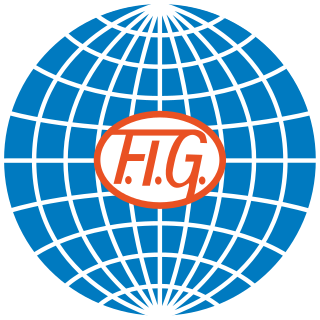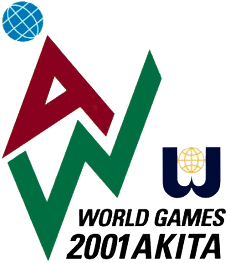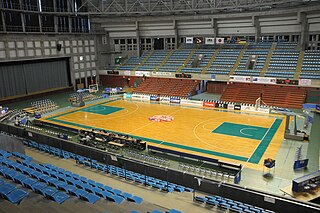
The World Games are an international multi-sport event comprising sports and sporting disciplines that are not contested in the Olympic Games. They are usually held every four years, one year after a Summer Olympic Games, over the course of 11 days. The World Games are governed by the International World Games Association, under the patronage of the International Olympic Committee.

Rhythmic gymnastics is a sport in which gymnasts perform individually or in groups on a floor with an apparatus: hoop, ball, clubs, ribbon and rope. The sport combines elements of gymnastics, dance and calisthenics; gymnasts must be strong, flexible, agile, dexterous and coordinated. Rhythmic gymnastics is governed by the International Gymnastics Federation (FIG), which first recognized it as a sport in 1963. At the international level, rhythmic gymnastics is a women-only sport.

The International Gymnastics Federation is the body governing competition in all disciplines of gymnastics. Its headquarters is in Lausanne, Switzerland. It was founded on 23 July 1881 in Liège, Belgium, making it the world's oldest existing international sports organisation. Originally called the European Federation of Gymnastics, it had three member countries—Belgium, France and the Netherlands—until 1921, when non-European countries were admitted and it received its current name.

The 2001 World Games, the sixth World Games, were an international multi-sport event held in Akita, Japan.

Elena Tkachenko is an Individual Rhythmic Gymnast who competed for Belarus.

Irina Alexandrovna Viner, formerly Irina Alexandrovna Viner-Usmanova, is a Russian rhythmic gymnastics coach who is head coach of the Russian national team, former president of the Russian Rhythmic Gymnastics Federation, and former vice president of the Rhythmic Gymnastics Technical Committee of the International Gymnastics Federation.
The Rhythmic Gymnastics World Cup is a competition for rhythmic gymnastics sanctioned by the Fédération Internationale de Gymnastique (FIG). It is one of the few tournaments in rhythmic gymnastics officially organized by FIG, as well as the World Championships, the gymnastics competitions at the Olympic Games and the Youth Olympics, and the rhythmic gymnastics events at the World Games. The World Cup series should not be confused with the Rhythmic Gymnastics Grand Prix series, which is neither officially organized nor promoted by FIG.

Gymnastics at the 2020 Summer Olympics in Tokyo was held in three categories: artistic gymnastics, rhythmic gymnastics and trampolining. All gymnastics events were staged at the Olympic Gymnastic Centre, Tokyo in 2021.
The 2015 Rhythmic Gymnastics World Championships, the 34th edition, was held in Stuttgart, Germany, from September 7 to 13, 2015 at the Porsche Arena. It acted as a qualifying competition for the 2016 Summer Olympics.
FIG World Cup refers to a number of events organized by the International Gymnastics Federation (FIG) across seven competitive gymnastics disciplines: 1) acrobatic gymnastics, 2) aerobic gymnastics, 3) men's artistic gymnastics, 4) women's artistic gymnastics, 5) women's rhythmic gymnastics, 6) trampoline and tumbling, and 7) parkour.
The South American Gymnastics Confederation (CONSUGI) organizes South American Gymnastics Championships in different disciplines of gymnastics: men's and women's artistic gymnastics, rhythmic gymnastics, trampoline and tumbling, as well as aerobic gymnastics.

CNA Arena Akita is an arena in Rinkai-area, Akita, Japan. It is owned and run by the city. Cable Networks Akita acquired its naming rights in 2015. The silver-colored building opened in 1994 and holds 5,000 people. The gym has a dome-shaped 154 feet height ceiling, and added 2,088 extra seatings in 2016. It is the home arena of the Akita Northern Happinets of the B.League, Japan's professional basketball league. The biggest basketball court in Akita is Akita Prefectural Gymnasium.

The acrobatic gymnastics tournaments at the 2001 World Games in Akita was played between 19 and 21 August. 75 acrobatic gymnastics competitors, from 11 nations, participated in the tournament. The acrobatic gymnastics competition took place at Akita City Gymnasium.

The aerobic gymnastics tournaments at the 2001 World Games in Akita was played between 17 and 18 August. 46 acrobatic gymnastics competitors, from 13 nations, participated in the tournament. The aerobic gymnastics competition took place at Akita City Gymnasium.

The rope event in rhythmic gymnastics at the 2001 World Games in Akita was played from 22 to 23 August. The competition took place at Akita City Gymnasium.

The hoop event in rhythmic gymnastics at the 2001 World Games in Akita was played from 22 to 23 August. The competition took place at Akita City Gymnasium.

The ball event in rhythmic gymnastics at the 2001 World Games in Akita was played from 22 to 23 August. The competition took place at Akita City Gymnasium.

The clubs event in rhythmic gymnastics at the 2001 World Games in Akita was played from 22 to 23 August. The competition took place at Akita City Gymnasium.

The trampoline gymnastics tournaments at the 2001 World Games in Akita was played between 19 and 21 August. 75 acrobatic gymnastics competitors, from 22 nations, participated in the tournament. The trampoline gymnastics competition took place at Akita City Gymnasium.
Gymnastics competitions at the 2024 Summer Olympics in Paris were contested in three categories: artistic gymnastics, rhythmic gymnastics and trampolining. The artistic and trampoline events occurred at the Accor Arena, with the rhythmic events staged at Porte de La Chapelle Arena from 8 to 10 August.










